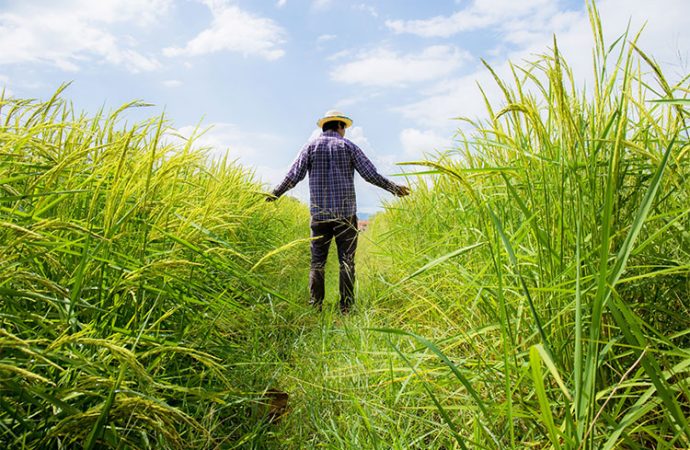Author Recent Posts Agha Zain ul Abdin Latest posts by Agha Zain ul Abdin (see all) Modern Corporate Farming: Transforming Agriculture and Enhancing Food Security in Pakistan – August 10, 2023
Establishing corporate farming in Pakistan is an imperative step towards modernising the agricultural sector, tapping the stock market and ensuring national food security in the country. Pakistan’s increasing population faces serious concerns about food insecurity in Pakistan. Similarly, Pakistan has relied on other nations for its production needs resulting into billions of dollar worth of imports. Will the project contribute to strengthening Pakistan’s agricultural self-sufficiency? Can this initiative effectively tackle food security
challenges in Pakistan?
Corporate agriculture farming (CAF) has been acknowledged globally for bringing modern agricultural practices, seed research and development. Therefore, in order to make it a norm for securing better food production in the country, last year the defence institutions of Pakistan established a new project of FonGrow under Fauji Foundation. Its aims include; Leveraging on the high-tech agri-facilities and modern practices, develop large-scale corporate farms and value-added agro-eco system in order to contribute to the food security of Pakistan. Likewise, Fongrow launched modern corporate farming project which established 2,250-acre site of country’s first corporate farm in its first stage.
The project has it benefits, as intended by FonGrow, a subsidiary of Fauji Foundation, highlights that the project is highly beneficial for Pakistan, as it will focus on import-substitution farming. By focusing on this approach, the goal is to boost domestic agricultural production to the point where it can replace the need for importing those goods. This can have economic benefits by reducing the money spent on imports and promoting self-sufficiency in food and agricultural products. To illustrate, according to data shared by the Pakistan Bureau of Statistics (PBS) indicates that Pakistan’s annual food imports bill hit $9 billion in the fiscal year 2021-22, all-time high in the country’s history.
The country’s agriculture needs to be expanded both horizontally and vertically with a view to increasing area under cultivation and enhancing per acre. The CEO of FonGrow ensured that FonGrow is simultaneously targeting both these goals by employing resource conservation technology. He further said, the project will be the pioneer of fully mechanised, intelligent farming with the support recently launched Green Pakistan Initiative and Special Investment Facilitation Council (SIFC). For instance, FonGrow reported that the first trial of maize crop has yielded 20% more output than the output of progressive farmers, with lesser use of water, fertiliser and other inputs.
Special Investment Facilitation Council (SIFC) will play an indispensable role by offering an array of opportunities and benefits to attract both domestic and foreign investors, keen in establishing large-scale agricultural projects in Pakistan. It will provide opportunities to the investors to cultivate on under-cultivated or non-cultivated lands in country while equally sharing the agricultural production on an agreed percentage. By mobilising both local and international investors, SIFC will create an environment conducive for the proliferation of corporate farming by using modern farming equipment. President Kissan Ittehad Khalid Mehmood highlighted the potential of corporate farming to attract a substantial Rs100 billion investment in the agriculture sector within three years.
The establishment of Modern Corporate Project will also generate countless job opportunities particularly in rural areas. From skilled labor in farming operations to administrative roles, employment generation will contribute to socioeconomic growth in rural areas, improving living standards and lowering poverty levels. For example, according to the World Bank collection of development indicators, employment in agriculture sector in Pakistan is less than 30%. Hence, Large-scale farming operations can create jobs both directly, through agricultural activities, and indirectly, through support services like transportation, processing, and marketing.
There are certain uncorroborated claims about the project, particularly on social media, that corporate farming initiatives under SIFC will result in the sale of land to Gulf countries or that investors from abroad will get crops at cheaper rates and Pakistan will be benefited very little. Similarly, it was criticised that it would negatively impact small farmers, however, the misconception was dismissed by the CEO FunGrow, he said, the project is not against or competing with small-scale farmers. Rather, he claimed, this initiative would help introduce best farming practices at different levels.
Agriculture contributes 23 percent to Pakistan’s GDP and employs 37.4 percent of the labor force but productivity is currently below par. Thus, the government of Pakistan along with the national institutions should take initiatives to further expand the corporate farms, contribute towards import-substitution, reduce foreign dependancy, elevate employment in agriculture sector, mechanise farming to increase production, attract national and international investors. The implementation of these measures will sufficiently enhance food security, increase exports and reduce agriculture-related imports.












Leave a Comment
Your email address will not be published. Required fields are marked with *